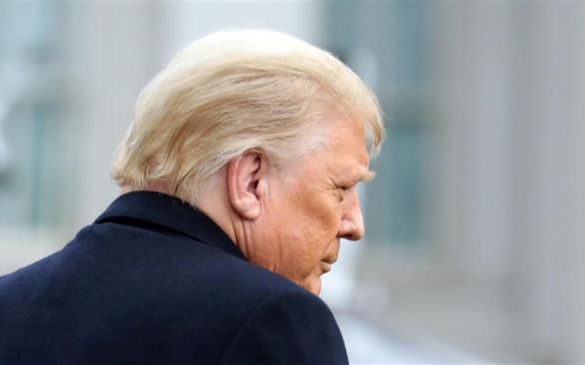
Donald Trump faces uncertain legal future after leaving White House. (Photo: Reuters)
Washington, December 16 (RHC)-- U.S. President Donald Trump appears to be leaving the White House but he is not going to fade away quietly. After failing in his legal efforts to overturn his November 3 election loss to Democrat Joe Biden, who on Monday won the state-by-state Electoral College vote that formally determines the U.S. presidency, Trump will re-enter private life on January 20th with an array of opportunities.
They include another White House run in 2024 or new pursuits in media. But observers say that his future is clouded by potential legal jeopardy and business challenges. Only one thing is certain: Trump’s thirst for the spotlight will ensure he does not follow in the footsteps of past presidents like George W. Bush, who quietly took up painting, or Jimmy Carter and his global activism.
Many political observers say that Trump’s future, like his presidency, is likely to be loud, brash and brazen.
It will also not be entirely under his control. He faces a range of civil and criminal legal actions related to his family’s businesses and his activities before he took office, which could accelerate once he loses the legal protections granted to the occupant of the Oval Office.
The real estate developer-turned-reality TV star is considering multiple maneuvers to retain the spotlight. Trump, who has refused to concede his election defeat and continues to make baseless claims of widespread voter fraud, has told allies he is considering another White House bid.
He has even discussed not attending Biden’s inauguration and announcing his 2024 run that day, a move that would allow him to continue the raucous campaign rallies he thrived on in 2016 and 2020.
That would complicate life for a long list of other Republicans considering a 2024 run -- including Vice President Mike Pence, former U.N. Ambassador Nikki Haley and Senators Marco Rubio and Tom Cotton -- who would have to weigh whether to take on Trump.
But it would be the sort of norm-busting move Trump relishes. The U.S. Constitution allows presidents to be elected to office twice and the terms do not have to be consecutive.
Trump has already formed a political action committee that will allow him to raise money and exert influence in the party after he leaves office, whether he becomes a candidate or not.
Trump’s desire to retain his political influence also was evident in his recent endorsement of close ally Ronna McDaniel for another term as Republican National Committee chairwoman. RNC members will vote in late January on whether to keep McDaniel as chair in an early test of how powerful Trump remains and how willing Republicans are to subjugate the party to his wishes.
The former star of reality series “The Apprentice,” Trump has also discussed several possible new media ventures to keep him in the spotlight, advisers said, including a television channel or a social media company to compete with those he felt betrayed him.
A television news channel would take on Fox News, a close Trump ally that has drawn his ire since the election for being insufficiently supportive. Aides described Trump as particularly irate at Fox News for its election-night decision to call the swing state of Arizona for Biden when the result was still uncertain.
Biden eventually won Arizona, but most other networks did not make the call for days afterward.
Trump could collaborate with existing conservative cable networks One America News Network or Newsmax, which have both focused heavily on positive portrayals of Trump.
Trump also has discussed with advisers a plan to start a social media company to compete with Twitter Inc, which has repeatedly posted content warnings on his tweets that make unfounded allegations of widespread election fraud.
But Trump faces significant financial challenges, including a hit to his business brand given his polarizing presidency and to his real estate, travel and leisure industry holdings from the coronavirus pandemic.
Forbes estimated in September that Trump’s net worth had dropped an estimated $600 million in the previous year, to $2.5 billion. The New York Times reported Trump had personally guaranteed $421 million of his companies’ debts.

